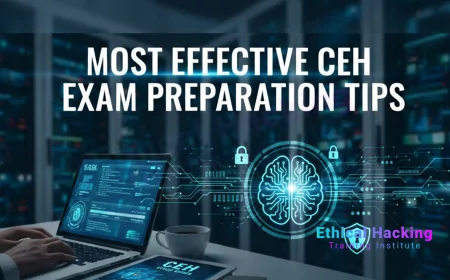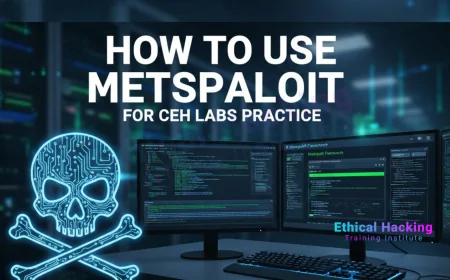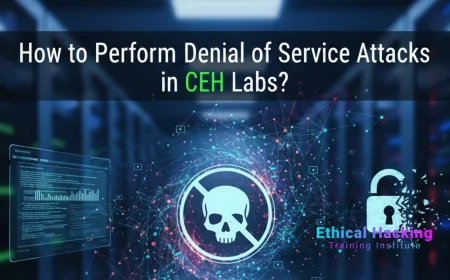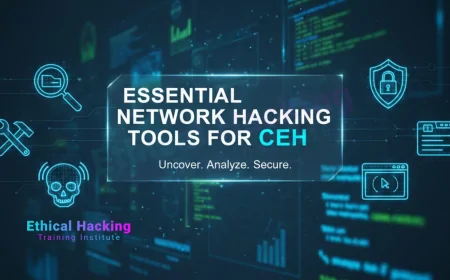EC Council Certified Forensic Investigator: The Importance of This Credential in Digital Forensics | EC-Council Forensic Investigator: A Key Credential for Digital Forensics Experts
Explore the importance of the EC-Council Certified Forensic Investigator (CHFI) credential in digital forensics. Learn benefits, exam details, tools, and career paths.
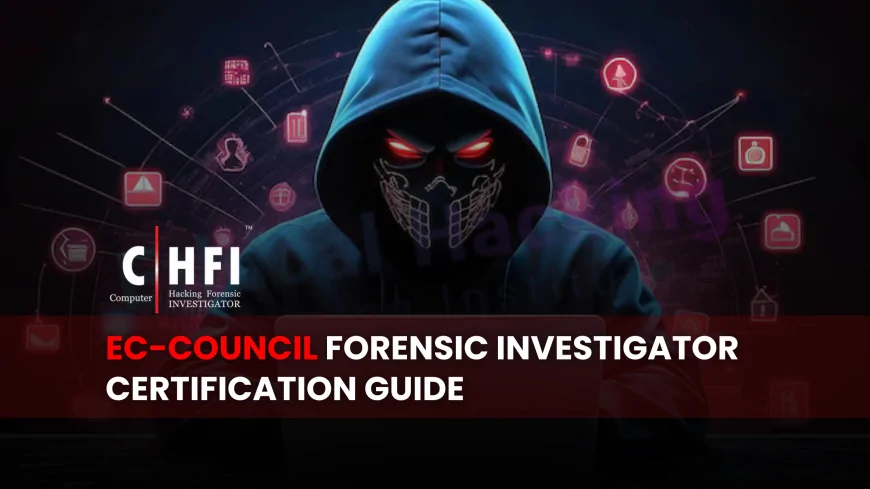
Table of Contents
- Introduction
- What is the EC-Council CHFI Certification?
- Why is CHFI Important in Digital Forensics?
- Core Skills You Gain Through CHFI
- Real-World Applications of CHFI
- Top CHFI Training Options
- Tools Covered in CHFI
- CHFI Certification Exam Structure
- Career Benefits of Becoming CHFI Certified
- Demand for Forensic Investigators in Cybersecurity
- How to Get Certified
- FAQs
- Conclusion
Introduction
In today’s cybercrime-ridden digital age, the need for forensic professionals who can trace digital footprints, identify breaches, and present cyber evidence in legal formats has never been greater. The EC-Council Certified Hacking Forensic Investigator (CHFI) credential is a prestigious and powerful certification for those aspiring to work in digital forensics and incident response. This article explores why the CHFI credential holds immense value and how it shapes careers in digital forensics and cybersecurity.
What is the EC-Council CHFI Certification?
Offered by the EC-Council, CHFI is a globally respected certification for cyber forensic investigators. It is designed for individuals working in cybersecurity, law enforcement, and IT who need to understand how to conduct digital investigations, recover deleted data, analyze hacking attempts, and collect admissible evidence.
The CHFI credential demonstrates that the holder is proficient in handling digital forensics, including malware analysis, email tracing, steganography, and more—using court-recognized procedures and tools.
Why is CHFI Important in Digital Forensics?
The CHFI certification is critical because it fills the skill gap in cybercrime investigation. With the rapid evolution of cyber threats such as ransomware, phishing, data breaches, and insider threats, it’s essential for professionals to know how to investigate, trace, and preserve digital evidence legally.
- It is recognized by law enforcement, government agencies, and private cybersecurity firms worldwide.
-
The certification aligns forensic practices with legal requirements, including GDPR, HIPAA, and CCPA.
- It helps professionals respond to incidents faster and more accurately.
Core Skills You Gain Through CHFI
- Understanding forensic tools and digital evidence acquisition
- Performing data recovery and memory analysis
- Tracing cyberattacks and recovering tampered or deleted data
- Handling anti-forensics, steganography, and data-hiding techniques
- Working with operating system forensics (Windows, Linux, Mac)
- Preparing legally compliant reports and evidence documentation
Real-World Applications of CHFI
CHFI-certified professionals are capable of working in highly sensitive roles. Examples include:
- Investigating insider threats in corporations
- Helping law enforcement track cybercriminals
- Supporting court cases with admissible digital evidence
- Working in corporate incident response teams to mitigate breaches
Top CHFI Training Options
Some of the best training options for CHFI include:
- EC-Council iClass: CHFI candidates can train directly with EC-Council iClass, featuring virtual labs and bundled exam vouchers.
- Infosec Institute: Infosec’s CHFI bootcamp combines live teaching with a focused exam prep approach.
- Simplilearn: Blended learning with labs, videos, and support
- Koenig Solutions: One-on-one training sessions and customized delivery
Tools Covered in CHFI
CHFI training includes hands-on experience with industry-standard forensic tools such as:
- FTK Imager
- Autopsy
- Volatility Framework
- Wireshark
- Oxygen Forensic Suite
- Stellar Toolkit
- X-Ways Forensics
CHFI Certification Exam Structure
- Exam Code: 312-49
- Questions: 150 Multiple Choice
- Duration: 4 Hours
- Passing Score: 70% (approx., based on cut score method)
- Delivery: Online proctored or via Pearson VUE centers
Career Benefits of Becoming CHFI Certified
This certification unlocks access to critical roles in the cybersecurity industry, such as:
- Digital Forensics Analyst
- Incident Responder
- Cybercrime Investigator
- Forensic Consultant
- Security Operations Center (SOC) Analyst
Demand for Forensic Investigators in Cybersecurity
The demand for digital forensic investigators has surged dramatically due to the increasing frequency, complexity, and severity of cybersecurity breaches. As cyberattacks target critical infrastructure, financial systems, government data, and corporate intellectual property, organizations are realizing the need for trained professionals who can analyze attacks, trace threat actors, and preserve digital evidence.
Why Demand is Rising
- Explosion in Cybercrime Cases
-
-
Ransomware, insider threats, data breaches, and cyber espionage are growing exponentially.
-
According to Cybersecurity Ventures, cybercrime is expected to cost the world $10.5 trillion annually by 2025.
-
-
Compliance and Legal Accountability
-
Regulatory frameworks like GDPR, HIPAA, PCI-DSS, and CCPA demand that organizations document and investigate security incidents properly.
-
Digital forensics experts are key to meeting these compliance requirements.
-
-
Sophisticated Attack Vectors
-
Cybercriminals use techniques like fileless malware, deepfakes, and cloud-based intrusions, making post-breach investigation more complex.
-
Only well-trained forensic professionals can handle such advanced attacks.
-
-
Cloud and Hybrid Infrastructure
-
The migration to cloud services and remote work has widened the attack surface.
-
Digital forensic investigators are essential in understanding how attacks spread across platforms like AWS, Azure, and SaaS environments.
-
How to Get Certified
- Choose an EC-Council Accredited Training Partner (ATP)
- Complete official CHFI training with hands-on labs
- Practice using digital forensics tools and simulations
- Register and take the exam via Pearson VUE or ECC Exam portal
- Receive your CHFI certification and begin applying for roles
Frequently Asked Questions (FAQs)
1. What is CHFI certification?
CHFI is a globally recognized certification that validates expertise in digital forensics and cybercrime investigation.
2. Who offers the CHFI certification?
CHFI is offered by EC-Council (International Council of E-Commerce Consultants).
3. Is CHFI recognized globally?
Yes, CHFI is accepted worldwide in government, military, corporate, and legal sectors.
4. What is the duration of CHFI training?
It typically takes 5 days for bootcamps or 4–6 weeks for self-paced online formats.
5. What are the prerequisites for CHFI?
No strict prerequisites, but foundational knowledge of networking and cybersecurity is recommended.
6. Is CHFI better than CEH?
They serve different purposes: CEH focuses on ethical hacking, while CHFI specializes in digital forensics.
7. What tools are taught in CHFI?
Tools include FTK Imager, Autopsy, Volatility, X-Ways, Oxygen Forensics, and more.
8. How much does CHFI cost?
The cost ranges from $1,500 to $3,000 depending on the provider and training format.
9. What is the CHFI exam format?
150 multiple-choice questions in a 4-hour proctored exam session.
10. Is CHFI hard to pass?
It requires a strong understanding of forensic processes and practice with tools, but is manageable with proper preparation.
11. How long is the CHFI certification valid?
It is valid for 3 years and requires renewal via EC-Council’s ECE policy.
12. Can I take CHFI training online?
Yes, EC-Council and partners offer fully online training with labs and live classes.
13. What jobs can I get with CHFI?
You can work as a Forensics Analyst, Incident Responder, Cybercrime Investigator, and more.
14. Is CHFI suitable for law enforcement?
Yes, it is especially suited for law enforcement officers investigating cybercrimes.
15. What is iLabs in CHFI?
iLabs is EC-Council’s cloud-based lab platform for hands-on forensic practice.
16. Can beginners take CHFI?
Yes, but a basic understanding of IT or completion of CEH is beneficial.
17. Does CHFI include legal aspects?
Yes, CHFI includes training on chain of custody, admissibility of evidence, and compliance laws.
18. Are there scholarships for CHFI?
Some training providers offer discounts, but official scholarships are rare.
19. How do I prepare for CHFI?
Join an official training, use iLabs, read EC-Council’s courseware, and take practice tests.
20. Is CHFI worth it?
Absolutely. It boosts career opportunities, provides in-demand skills, and builds credibility in cybersecurity.
Conclusion
The EC-Council’s Certified Hacking Forensic Investigator (CHFI) certification is a vital credential for anyone aspiring to master the art of digital investigations. In an era where cybercrime affects every sector, CHFI not only validates your ability to trace and analyze incidents but also prepares you to provide evidence in legal settings. Whether you’re in law enforcement, cybersecurity, or private consulting, CHFI is a game-changing credential that showcases your investigative expertise.
What's Your Reaction?
 Like
0
Like
0
 Dislike
0
Dislike
0
 Love
0
Love
0
 Funny
0
Funny
0
 Angry
0
Angry
0
 Sad
0
Sad
0
 Wow
0
Wow
0






